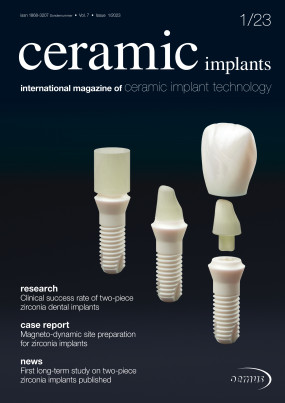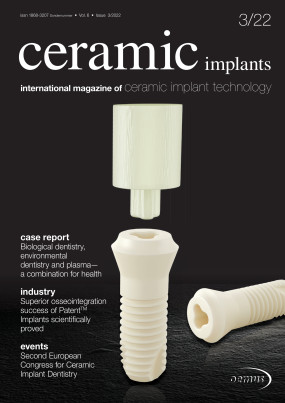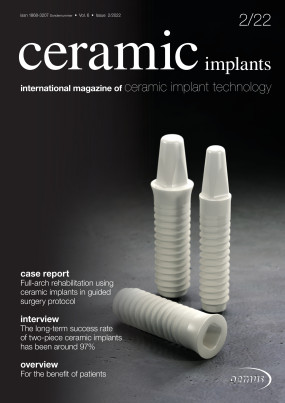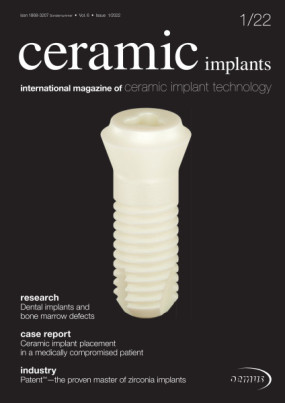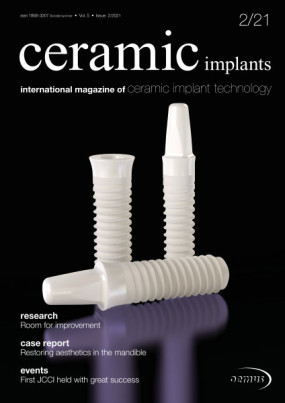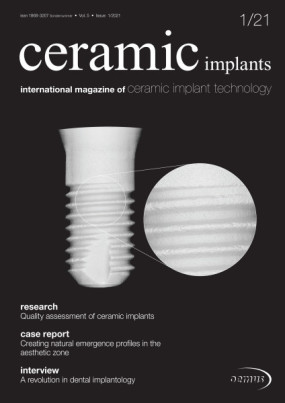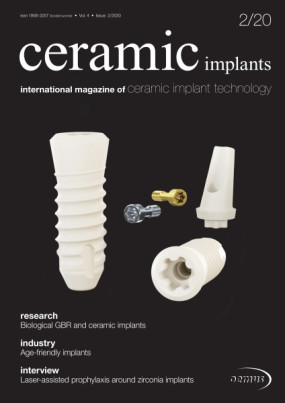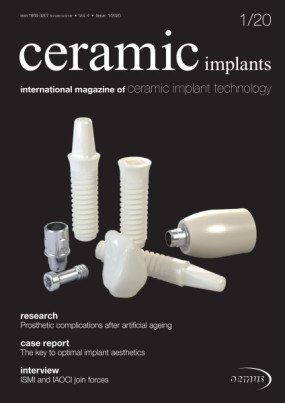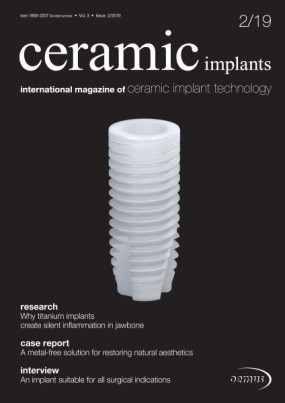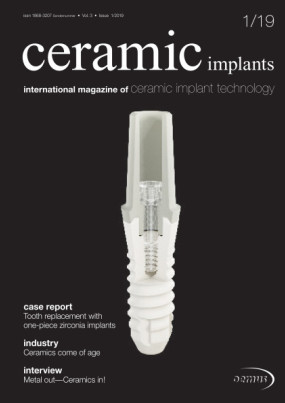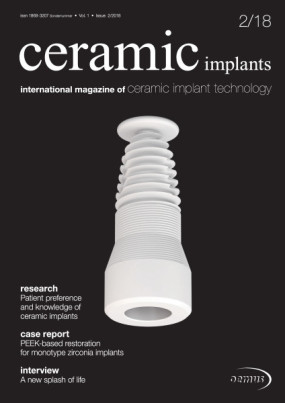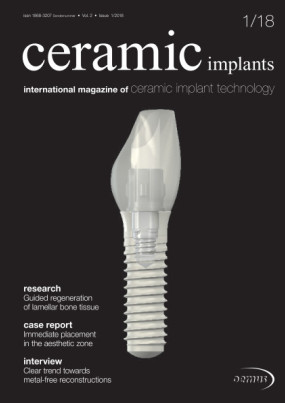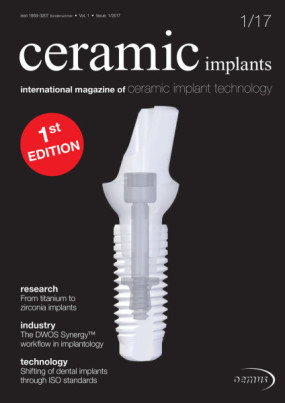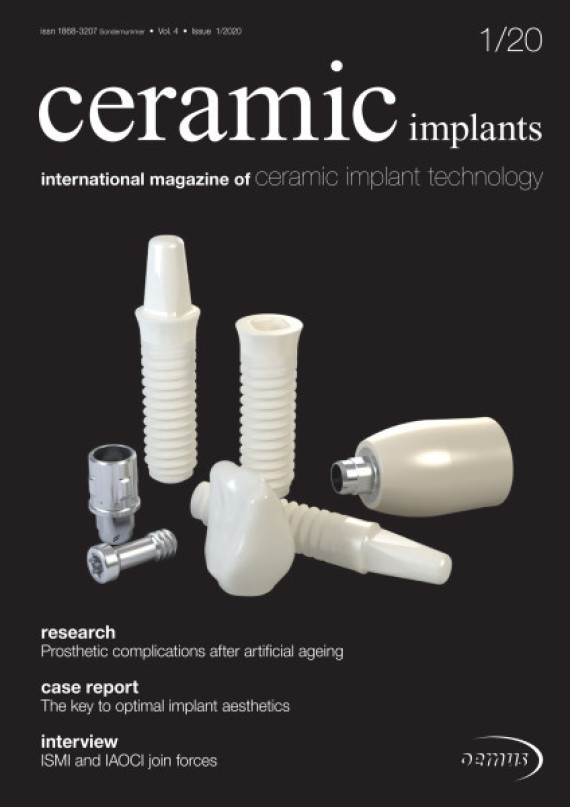Inhaltsverzeichnis
1
3
Ceramic implantology has never been this multifaceted. The users are able to choose from a great repertoire of one- and two-piece implant systems by acknowledged vendors and manufacturers. Especially the two-piece implant systems promise great prosthetic variety and flexibility, otherwise only known from titanium systems. Multi-unit implant-supported works are now feasible for specific indications. Of course, all of that requires a high degree of education and training for the users to understand and master the advantages and limitations inherent in the system of the respective ceramic implant concept...
4
6
Prosthetic complications after artificial ageing
Dr Manuel Reinisch (lead author), Dr Martin Koller, Dr Elisabeth Steyer, Prof. Karl Glockner, Prof. Norbert Jakse & Prof. Michael Payer (co-authors), Austria
Currently, the majority of ceramic implants used are one-piece implant systems, which, however, have some limitations and disadvantages.1, 2 One-piece implants cannot always be inserted in the optimal orientation and require angulation correction to enable prosthetic restoration. In addition, one-piece implants are subjected to soft tissue and chewing forces immediately after insertion. These reasons motivated the development and manufacture of two-piece ceramic implants...
10
Biological guided bone regeneration and ceramic implants
Dr Karl Ulrich Volz, Dr Stephanie Vergote, Dr Rebekka Hueber & Dr Josephine Tietje, Switzerland; Dr Tobias Wilck & Prof. Shahram Ghanaati, Germany
Ceramic implants consist of high-performance ceramic zirconium dioxide. As the material is present in its oxide state, it no longer reacts chemically,1 does not exhibit free-binding electrons and is inert.2 Temperatures above 2,600 °C or the application of hydrofluoric acid are necessary to change the material. The low affinity with plaque, the lack of thermal and electrical conductivity, and the resistance to corrosion are great benefits of zirconium dioxide over titanium.1–8....
18
In 2019, the FDA released two decades of previously un-published data and 2.1 million reports of failed dental implants from which more than 100,000 reports referred to 2018 alone. Most of these failures related to a lack of os-seointegration, raising major concerns among dentists in the US and abroad as the number of additional unreported losses is likely to be much higher. Comments made by manufacturers, regarding these figures, focus on patients with unfavourable clinical preconditions and even blame dentists for their lack of experience and training. Is this the whole truth? ...
20
Zirconium-dioxide as preferred material for dental implants
1 Professor for Implant Dentistry at the College of Medicine & Dentistry (Ulster University in Birmingham, UK); 2 EACIm Ambassador to the UK and The Netherlands; 3 Professor and Dean at the College of Medicine & Dentistry (Ulster University in Birmingham,
In a recent survey in Europe of > 250 people, by a respected dental implant company; most patients indicate to prefer a ceramic implant (35 %) over a titanium implant (10 %) to replace a tooth in their mouth, whereas 55 % had no specific preference in the latter. Presently however, the implant market is still dominated by tita-nium implants (> 95 %) and there-fore ceramic implants are still con-sidered as a sort of niche product in implant dentistry for the moment. But things are changing...
24
Ceramic or zirconia implants have appeared in the literature for more than 30 years and have been proposed as a solution for replacement of teeth in edentulous areas. Clinical studies have also shown positive results, as opposed to with titanium implants. Throughout the last decade, ceramic implants have become a part of our implant treatment plans. Besides the aesthetic advantage, the significant interest in zirconia implants is related to its good soft-tissue response. This material seems to have greater biological acceptance by the body, which could lead to a decline in peri-implantitis cases. However, more research is needed to confirm this hypothesis...
30
A 58-year-old male patient presented with a dental gap where tooth #15 had been missing for many years. He had been recommended to the practice by another patient. He was fit and healthy with an unremarkable medical history. Having undergone extensive restorative treatment in the past, the patient was very aware of the different procedures that are currently available to restore teeth. As such, the challenge of this case was to effectively manage the patient—the restorative aspect of treatment was crucial to success, especially as the patient had high expectations of the overall result...
34
Immediate restoration with one-piece zirconia implants
Dr Kazuhiko Okamoto, Prof. Shuji Ohkawa, Dr David Ashley & Prof. Yung-Tsung Hsu, Japan & USA
Zirconia implants have been recommended as a possible alternative to traditional titanium implants.1 Compared with titanium implants, zirconia implants show favourable results regarding biocompatibility, soft-tissue reaction and aesthetic outcomes.2, 3 Although two-piece zirconia implants are available in the market, the long-term prognosis of this design is still unknown.4, 5 One-piece zirconia implants have demonstrated satisfactory results;6, 7however, with the one-piece design, there are signifi-cant challenges for both clinicians and patients during the healing time. For clinicians, occlusal forces may be applied to the implants before they are osseointegrated. This increases the risk of failure if the forces are too great or if the initial implant stability is less than ideal.8 For patients, the main concerns are related to maintaining aesthetics and function during the healing time...
40
A 60-year-old man presented with a free-end situation in regions #26 and 27 which had been this way for about eight years. Three years ago, a PURE Monotype was successfully implanted in position 36 and fitted with a prosthetic restoration. His dental hygiene was excellent and region 36 was not irritated in any way. The patient now wanted to treat position 26 with a ceramic implant without major surgical intervention. 3D imaging (CBCT) showed sufficient transverse bone and a vertical height of approximately 5–6 mm to the maxillary sinus and thus, the use of a two-piece implant with an internal sinus lift was planned...
42
Growing health concerns of patients have led to an increasing demand of metal-free restorations. The same is true for dental implants. As dental professionals it is our goal to ful-fil this demand of our patients in the most predictable way. When it comes to implant treatments the two most cru-cial aspects regarding a treatment success are the osseo-integration of the implant and the prosthetic workflow. The Patent™ implant system features a novel zirconia implant design with an innovative prosthetic connection. In a pro-spective cohort study by Becker et al. 2017, the Patent™ implant system was evaluated for posterior single tooth ap-plications with good results...
46
The Ceramic Excellence Program is an online training programme for the use of the CERALOG® ceramic implant system. It takes place on an innovative online platform: Dental Campus. The content of the Dental Campus educational programme is provided by an international network of teaching centres. It is reviewed by a global independent committee of renowned experts and divided into different modules that cover the entire field of implantology...
48
54
In this interview, new Dentalpoint CEO Adrian Hunn talks about the new competence centre for Zeramex Digital Solutions and master dental technician Peter Hölldampf, laboratory manager at the Germany-based machining centre Geiger Dentaltechnik, a close partner of Zeramex, discusses material-specific aspects of zirconium dioxide...
57
Drs Sammy Noumbissi (US) and Karl Ulrich Volz (Switzrland) are two of the most experienced surgeons worldwide when it comes to modern one-piece and two-piece ceramic implants. In the past 20 years, the two combined have successfully placed several thousand ceramic implants. Moreover, they are the founding presidents of the first two international expert societies for ceramic implantology—the International Academy of Ceramic Implantol-ogy (IAOCI) and the International Society of Metal Free Implantology (ISMI). Ceramic implants had the opportu-nity to interview the two about future joint activities...
60
In 2018, the European Academy of Ceramic Implantology (EACim) was founded to help promote advancements in ceramic implantology in Europe. In this inter-view with ceramic implants, EACim President Dr Giancarlo Bianca elaborates on the need for an additional expert society dedicated to zirconia implants...
62
Under very challenging and difficult circumstances, the 9th Annual Congress of the International Academy of Ceramic Implantology (IAOCI) took place from 14 to 16 March in New Orleans, Louisiana, USA. This year the theme was “Ceramic Implants: A New Reality in Implantology”. We were excited about being able to facilitate and provide a business-to-business networking component to this event where OEM ceramic manufacturers were matched; those who attended were able to come to agreements with future and prospective ceramic implants manufacturers and distributors...






